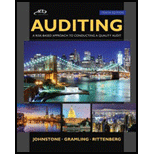
Auditing: A Risk Based-Approach to Conducting a Quality Audit
10th Edition
ISBN: 9781305080577
Author: Karla M Johnstone, Audrey A. Gramling, Larry E. Rittenberg
Publisher: South-Western College Pub
expand_more
expand_more
format_list_bulleted
Question
Chapter 5, Problem 70RSCQ
To determine
Introduction:Internal control is the process which is undertaken by the organization to ensure the effectiveness of the financial transactions that are recorded.
To define: Theway by which auditor’s assessment of the control effectiveness affects the audit conduct and design.
Expert Solution & Answer
Trending nowThis is a popular solution!

Students have asked these similar questions
General accounting
Interest expense for the year ended December 31, 2010 was ????
General Account
Chapter 5 Solutions
Auditing: A Risk Based-Approach to Conducting a Quality Audit
Ch. 5 - Prob. 1TFQCh. 5 - Prob. 2TFQCh. 5 - Prob. 3TFQCh. 5 - Prob. 4TFQCh. 5 - Prob. 5TFQCh. 5 - Prob. 6TFQCh. 5 - Prob. 7TFQCh. 5 - Prob. 8TFQCh. 5 - Prob. 9TFQCh. 5 - Prob. 10TFQ
Ch. 5 - Prob. 11TFQCh. 5 - Prob. 12TFQCh. 5 - Prob. 13TFQCh. 5 - Prob. 14TFQCh. 5 - Prob. 15TFQCh. 5 - Prob. 16TFQCh. 5 - Prob. 17TFQCh. 5 - Prob. 18TFQCh. 5 - Prob. 19TFQCh. 5 - Prob. 20TFQCh. 5 - Prob. 21TFQCh. 5 - Prob. 22TFQCh. 5 - Prob. 23TFQCh. 5 - Prob. 24TFQCh. 5 - Prob. 25MCQCh. 5 - Prob. 26MCQCh. 5 - Prob. 27MCQCh. 5 - Prob. 28MCQCh. 5 - Prob. 29MCQCh. 5 - Prob. 30MCQCh. 5 - Prob. 31MCQCh. 5 - Which of the following accounts would not be...Ch. 5 - Prob. 33MCQCh. 5 - Which management assertion addresses whether the...Ch. 5 - Prob. 35MCQCh. 5 - Prob. 36MCQCh. 5 - Prob. 37MCQCh. 5 - Prob. 38MCQCh. 5 - Prob. 39MCQCh. 5 - Prob. 40MCQCh. 5 - Prob. 41MCQCh. 5 - Prob. 42MCQCh. 5 - Prob. 43MCQCh. 5 - Prob. 44MCQCh. 5 - Prob. 45MCQCh. 5 - Prob. 46MCQCh. 5 - Prob. 47MCQCh. 5 - Prob. 48MCQCh. 5 - Prob. 49RSCQCh. 5 - Prob. 50RSCQCh. 5 - Ray, the owner of a small company, asked Holmes,...Ch. 5 - Prob. 52RSCQCh. 5 - Prob. 53RSCQCh. 5 - Prob. 54RSCQCh. 5 - Professional guidance indicates that the auditor...Ch. 5 - Prob. 56RSCQCh. 5 - Assume that an organization asserts that it has...Ch. 5 - Prob. 58RSCQCh. 5 - Prob. 59RSCQCh. 5 - Prob. 60RSCQCh. 5 - Prob. 61RSCQCh. 5 - Prob. 62RSCQCh. 5 - Prob. 63RSCQCh. 5 - Prob. 64RSCQCh. 5 - Prob. 65RSCQCh. 5 - Prob. 66RSCQCh. 5 - Prob. 67RSCQCh. 5 - Prob. 68RSCQCh. 5 - Prob. 69RSCQCh. 5 - Prob. 70RSCQCh. 5 - Prob. 71RSCQCh. 5 - Prob. 72RSCQCh. 5 - Prob. 73RSCQCh. 5 - Prob. 74RSCQCh. 5 - Prob. 75RSCQCh. 5 - Prob. 76RSCQCh. 5 - Prob. 77RSCQCh. 5 - Prob. 79RSCQCh. 5 - Prob. 80RSCQCh. 5 - Prob. 81RSCQCh. 5 - Prob. 82RSCQCh. 5 - Prob. 83RSCQCh. 5 - Prob. 84RSCQCh. 5 - Prob. 85RSCQCh. 5 - Prob. 86RSCQCh. 5 - Prob. 87RSCQCh. 5 - Prob. 89RSCQCh. 5 - Prob. 90FFCh. 5 - Prob. 91FF
Knowledge Booster
Similar questions
- General accounting questionsarrow_forward7. Financial Accounting: Assume the following is the stockholders' equity section of the 2019 Max & Co., Inc., balance sheet. Stockholders' Equity ($ millions) 2019: Common stock, one cent 5,400,000,000 shares; Issued-2,976,223,337 shares-2019 Other paid-in capital Retained earnings par value; Authorized- $29.8 6,900 37,918.9 52.3 44,901 26,984.4 $17,916.6 Accumulated other comprehensive income Less treasury stock, at cost; 794,299,347 shares-2019 Total stockholders' equity How many common shares are outstanding as of December 31, 2019?arrow_forwardThe owner's equity in a business amounted to $76,000 at the beginning of the year and $135,000 at the end of the year. The owner had made no additional investments and had withdrawn $39,000 during the year. The net income for the year amounted to: A) $98,000 B) $91,000 C) $82,000 D) $87,000expert please give me answerarrow_forward
- Abcarrow_forwardThe owner's equity in a business amounted to $76,000 at the beginning of the year and $135,000 at the end of the year. The owner had made no additional investments and had withdrawn $39,000 during the year. The net income for the year amounted to: A) $98,000 B) $91,000 C) $82,000 D) $87,000arrow_forwardWhat was her capital gain yield?arrow_forward
- The net income for the year amounted toarrow_forwardHimani Co. computes its predetermined overhead rate annually on the basis of direct labour-hours. At the beginning of the year, it is estimated that its total manufacturing overhead would be $726,000 and the total direct labour would be 59,000 hours. Its actual total manufacturing overhead for the year was $993,400 and its total direct labour was 55,000 hours. Compute the company's predetermined overhead rate for the year.answer this questionarrow_forwardGeneral accountingarrow_forward
arrow_back_ios
SEE MORE QUESTIONS
arrow_forward_ios
Recommended textbooks for you
 Auditing: A Risk Based-Approach (MindTap Course L...AccountingISBN:9781337619455Author:Karla M Johnstone, Audrey A. Gramling, Larry E. RittenbergPublisher:Cengage Learning
Auditing: A Risk Based-Approach (MindTap Course L...AccountingISBN:9781337619455Author:Karla M Johnstone, Audrey A. Gramling, Larry E. RittenbergPublisher:Cengage Learning Auditing: A Risk Based-Approach to Conducting a Q...AccountingISBN:9781305080577Author:Karla M Johnstone, Audrey A. Gramling, Larry E. RittenbergPublisher:South-Western College Pub
Auditing: A Risk Based-Approach to Conducting a Q...AccountingISBN:9781305080577Author:Karla M Johnstone, Audrey A. Gramling, Larry E. RittenbergPublisher:South-Western College Pub

Auditing: A Risk Based-Approach (MindTap Course L...
Accounting
ISBN:9781337619455
Author:Karla M Johnstone, Audrey A. Gramling, Larry E. Rittenberg
Publisher:Cengage Learning

Auditing: A Risk Based-Approach to Conducting a Q...
Accounting
ISBN:9781305080577
Author:Karla M Johnstone, Audrey A. Gramling, Larry E. Rittenberg
Publisher:South-Western College Pub
